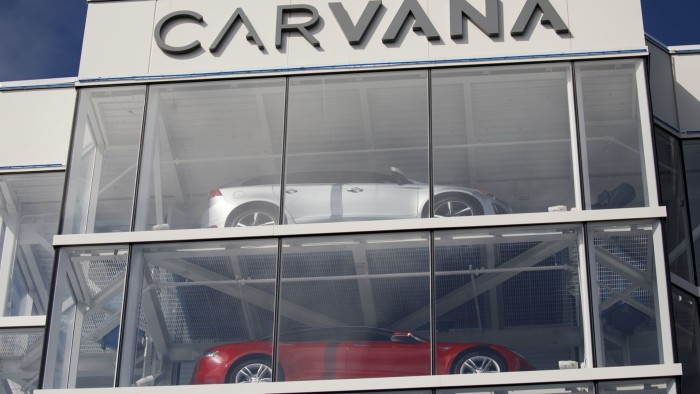Unlock the Editor’s Digest for free
Roula Khalaf, Editor of the FT, selects her favourite stories in this weekly newsletter.
Buyers of used cars must be on guard to make sure they don’t drive away with a lemon. The same is true of investors and lenders in used car dealerships. Three different US companies have of late been flashing warning signals, both for the sector and the broader economy.
Tricolor, the Texas-based lender and retailer, plunged into a shock bankruptcy liquidation in September. Allegations of fraudulent lending are now being investigated by legal authorities. CarMax, another dealership that sold more than 1mn used cars in 2024 through its national network and mobile app, is down 62 per cent this year. On Thursday it replaced its chief executive. Sales are falling; provisions for weak loans are rising.
Then there is Carvana, the so-called “Amazon of used auto”, which at one point this year had an $80bn market capitalisation. The dealership, which only sells cars online, has roared ahead of rivals. Yet even slightly declining profitability has knocked almost a quarter off its stock since early October.
The trio offer distinct narratives — Tricolor is a tale of alleged malfeasance — but all are variations on a theme of recession and deteriorating credit conditions. The tacit lesson is that Americans are willing to buy used cars — especially from Carvana, where the number of vehicles sold in the third quarter rose by 44 per cent, year on year — but their capacity or willingness to borrow and pay high prices for them is clearly moderating.
Unlike retailers in other sectors that merely have to deal with selling widgets, car dealerships often do more than just shift spruced-up vehicles. They also handle credit, originating loans for buyers to pay for their purchases, and sometimes selling them off in bundles to asset managers. These in-house shadow banks, lucrative in boom times, are becoming more concerning.
Last month, CarMax shocked investors when it unexpectedly boosted loan loss reserves to $142mn, a year-over-year jump of approximately a quarter. It said loans extended to car buyers in 2022 and 2023, just as inflation was accelerating and pandemic cash was drying up, were now most problematic, a sentiment Carvana also recently echoed.
Aggregate auto lending data shows reasons for some concern. Barclays analysts found that 30 day-plus delinquencies for securitisations of subprime auto loans had reached 16 per cent in September, a big jump from a year ago. The IMF says the proportion of auto loans for which payment is 90 days late is stable at around 2 per cent, but elevated.
Carvana shows there can still be relative outperformers, even in a weakening market. But the balance sheet risk companies have taken on is significant; existential in the case of Tricolor. And given dealerships’ reliance on subprime borrowers, when lemonade really does start to turn back into lemons, it’s these businesses that will sour first and fastest.




